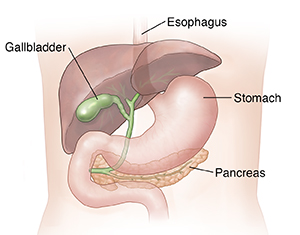Epigastric pain is pain in the upper abdomen. It can be a sign of disease. Common causes include:
-
Acid reflux (stomach acid flowing up into the esophagus)
-
Gastritis (irritation of the stomach lining). Most often this is from aspirin or NSAIDs (nonsteroidal anti-inflammatory drugs) such as ibuprofen, bacteria called H. pylori, or frequent alcohol use.
-
Peptic ulcer disease
-
Inflammation of the pancreas (pancreatitis)
-
Gallstone
-
Inflammation in the gallbladder (cholecystitis)
Pain may be dull or burning. It may spread upward to the chest or to the back. There may be other symptoms such as belching, bloating, cramps, or hunger pains. There may be weight loss or poor appetite, nausea, or vomiting.
Since the cause of your pain is not certain yet, you may need more tests. Sometimes your healthcare provider will treat you for the most likely condition to see if there is improvement before doing more tests. Talk with your provider about what is best for you.
Home care
Medicines
-
Antacids help neutralize the normal acids in your stomach. If you don’t like the liquid, you can try a chewable one. You may find one works better than another for you. Overuse can cause diarrhea or constipation. Call your provider if you have questions about your medicines or concerns about side effects.
-
Acid blockers (H2 blockers) decrease acid production. Examples are cimetidine and famotidine.
-
Acid inhibitors (PPIs) decrease acid production in a different way than blockers. You may find they work better but can take a little longer to take effect. Examples are omeprazole, lansoprazole, pantoprazole, rabeprazole, and esomeprazole. Many of these are available over-the-counter or as generics.
-
Take an antacid 30 to 60 minutes after eating and at bedtime, but not at the same time as an acid blocker.
-
Try not to take NSAIDs such as ibuprofen. Aspirin may also cause problems, but if you are taking it for your heart or other medical reasons, talk to your healthcare provider before stopping it.
Diet
-
If certain foods seem to cause your pain, try not to eat them. Certain foods can worsen symptoms of gastritis. Limit or avoid fatty, fried, and spicy foods, as well as coffee, chocolate, mint, and foods with high acid content such as tomatoes and citrus fruit and juices (orange, grapefruit, lemon).
-
Eat slowly and chew food well before swallowing.
-
Don't drink alcohol. It can irritate the stomach. If you have trouble giving up alcohol, ask your provider for treatment resources.
-
Don't consume caffeine or use tobacco. These can delay healing and worsen your problem.
-
Try eating smaller meals with snacks in between. Don't eat large meals before bedtime.
-
Keep an empty stomach for 2 to 3 hours before lying down.
-
Prop the head of the bed up if you have overnight symptoms. This helps acid clear from your esophagus.
Follow-up care
Follow up with your healthcare provider or as advised.
When to seek medical advice
Call your healthcare provider right away if any of the following occur:
-
Stomach pain worsens or moves to the right lower part of the abdomen
-
Frequent vomiting (can’t keep down liquids)
-
Blood in the stool or vomit (red or black color)
-
Fever of 100.4ºF (38ºC) or higher, or as directed by your healthcare provider
-
Abdominal swelling
-
Worsening symptoms or new symptoms
Call 911
Call
-
Chest pain appears, or if pain worsens or spreads to the back, neck, shoulder, or arm
-
Feeling weak or dizzy, fainting, or having trouble breathing


